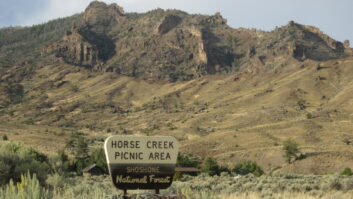A radio engineer in Chicago has filed a petition pressing the Federal Communications Commission to take action on what he calls a ghost translator station that exists only on paper.
The FCC should stop taking applicants’ word on whether projects have actually been built, said engineer Larry Langford. In this case, he alleges that rubber-stamp approvals may have deprived others from using a frequency during one of the recent AM translator windows.

Langford owns WGTO and W244DS in Michigan and is an amateur radio operator. He alleges that Houston-based licensee Centro Cristiano de Vida Eterna submitted falsified information to the FCC in multiple instances by claiming that a Chicago-based translator station had been constructed, then filing paperwork to move that translator to different spots multiple times.
The licensee apparently has since decided to formally drop its license request; Radio World has been unable to obtain further comment on the allegations.
Langford said that through research, site visits and conversations with local engineers, he found that no station exists, despite the fact that the FCC green-lighted applications for translator W252AW each step of the way, Langford said. This resulted in approvals for construction permits, several licenses to cover and minor change applications for a station that had not been constructed, he said.
In December 2016, Langford said he noticed a construction permit application had been submitted for a translator on 98.3 MHz that would be based on the Chicago Transit Authority Tower, a few blocks from his home. “Any time a translator is applied for in Chicago it’s a big deal,” Langford told Radio World. Not only does it take engineering skill to operate in such a spectrum-dense market, he said, but such a translator would be particularly valuable if it could be installed on a tall building downtown.
Langford said he watched for an antenna to be constructed on the Chicago Transit Authority Tower but did not notice one. Three months later after a look through the FCC application database, Langford said he noticed Centro Cristiano had already applied for a license to cover. “How did I miss that construction?” he said he asked himself. Langford drove to the tower but did not see a new antenna in place.
A series of background research efforts revealed that Centro Cristiano submitted a license application to begin operation of a transmitter on a tower operated by the Illinois Department of Transportation. Via details found through a Freedom of Information request, Langford said he found that no correspondence exists showing that the tower was leased, donated or otherwise used for operation of W252AW.
He said that Centro Cristiano then filed a minor change application for W252AW on a tower owned by CBS Radio and used by CBS’s WSCR(AM) in Chicago. This resulted in a construction permit and then a license to cover that was granted; however, according to Langford, CBS Radio staff told him that no FM translator had been installed on the WSCR tower.
Afterward, Centro Cristiano made a minor change application to move the W252AW transmitter to a tower in Chicago owned by the Chicago Transit Authority. Three months later they applied for a license to cover. Another Freedom of Information request revealed no documents relating to the lease of this tower to W252AW, Langford said.
A short time later, another application was filed to move the station to a high-rise building on South Calumet in Chicago. Centro Cristiano thereafter filed a license application certifying that the station was constructed and ready for operation at this location. According to Langford, however, during an inspection with the building’s engineer at the Calumet building, no FM transmission equipment could be found.
In late 2017, Langford filed an informal petition to deny and a supplement regarding the construction of translator W252AW. He called on the FCC to cancel the license of the station as well as to cite Centro Cristiano for several reasons: filing consecutive applications for construction permits with no reasonable assurance of site availability, filing multiple applications for license to cover on construction permits that were not built, and filing a minor change in a licensed facility application for a facility that was never properly licensed.
In his petition, Langford also suggested the FCC consider using licensed amateurs on a volunteer basis to inspect translators before a license is issued.
Centro Cristiano holds multiple licenses and construction permits for NCE FM, commercial FM, LPTV stations and FM translators. In the weeks since, an attorney representing Centro Cristiano said the licensee has decided to formally drop its license request. “It is not going to be pursued further,” attorney Dan J. Alpert said
Radio World asked Alpert to comment on Langford’s allegations and on what prompted the reversal; he has not made further comment. RW also requested comment on the case from the FCC, which has not responded.
Langford was blunt in his filing: “The facts are clear that none of the four locations referenced in the petition to deny have ever been built,” he wrote. “Centro Cristiano de Vida Eterna has perpetrated a clever fraud against the FCC and the citizens of Chicago.”










